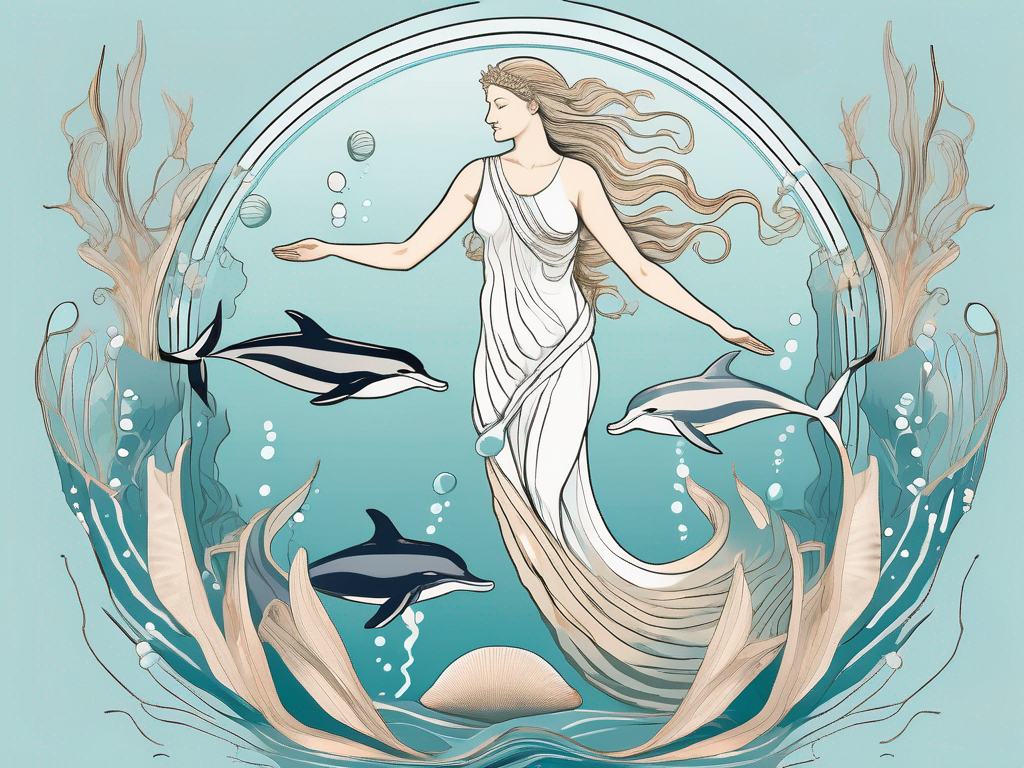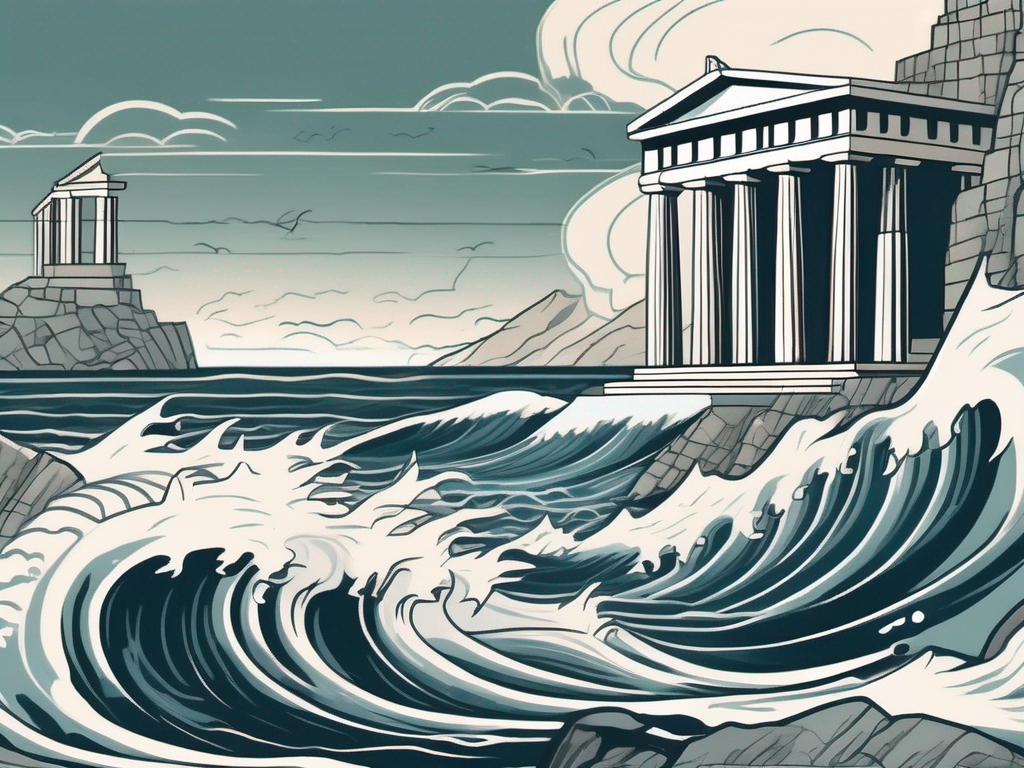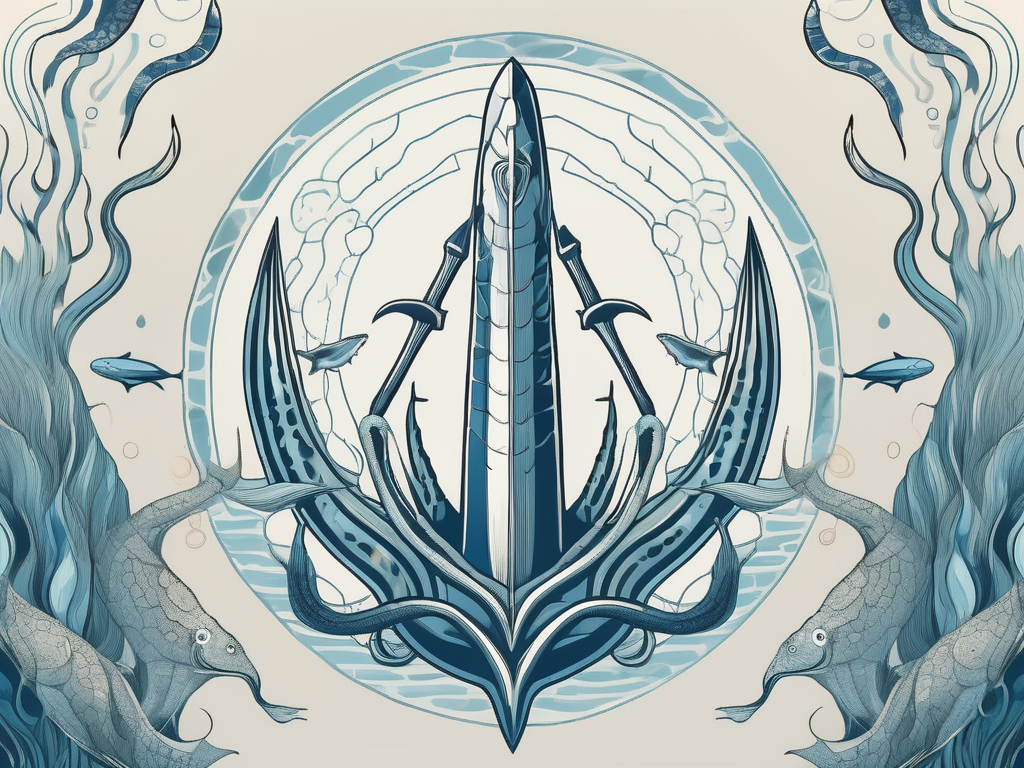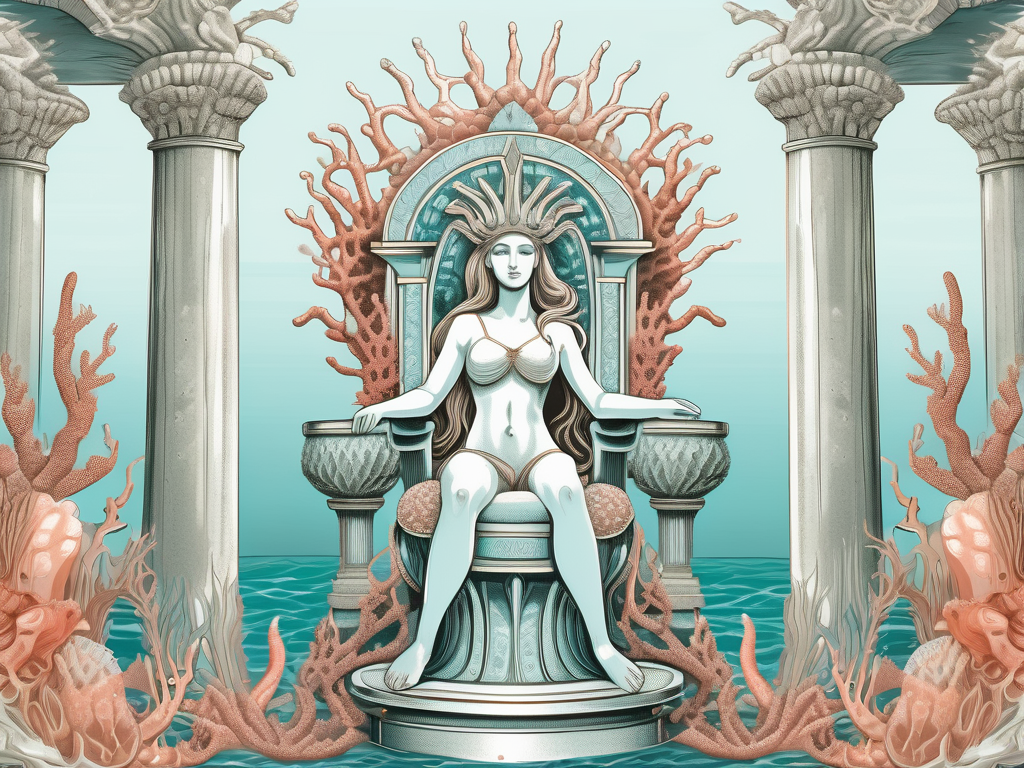In the vast pantheon of Greek mythology, few goddesses have captivated the imagination as much as Thetis. Known as a Nereid, a group of sea nymphs, Thetis played a pivotal role in many ancient Greek tales and legends. Throughout the ages, her name has echoed through the works of great poets like Homer and Hesiod, and her influence can still be seen today in literature, film, and art. Let’s dive deep into the mysteries and wonders surrounding Thetis, the enigmatic Greek goddess.
Understanding Thetis: The Nereid of Greek Mythology
Thetis in Greek Mythology: An Overview
Thetis was not just any ordinary Nereid. She was the daughter of the Titans Nereus and Doris, making her part of a divine lineage with a fascinating background. In Greek mythology, the Nereids were often depicted as beautiful and powerful sea nymphs, closely associated with the seas and the creatures that inhabited them. Thetis, however, stood out amongst her sisters due to her exceptional beauty and unrivaled power.
As the daughter of Nereus and Doris, Thetis inherited not only their divine qualities but also their deep connection to the sea. Nereus, known as the “Old Man of the Sea,” was a wise and ancient deity who possessed the ability to shape-shift into various forms. Doris, on the other hand, was a sea nymph, known for her grace and enchanting beauty. It was from this divine union that Thetis emerged, embodying the best of both her parents’ qualities.
Thetis’ beauty was said to be unparalleled, captivating all who laid eyes upon her. Her radiant presence and ethereal charm made her the object of desire for both gods and mortals alike. Many sought her hand in marriage, but it was the prophecy surrounding her future offspring that made her a highly sought-after bride.
The Nereids: Thetis’ Divine Lineage
Within the context of Greek mythology, Thetis’ divine lineage further elevated her standing in the pantheon. She and her sisters were part of the entourage of Poseidon, the god of the sea. Born from the union of Nereus and Doris, Thetis and her sisters were known to possess immense knowledge of the seas and their many secrets. This association with the domain of Poseidon and their deep understanding of the oceans bestowed upon them a certain reverence among the ancient Greeks.
Thetis’ sisters, the other Nereids, were also revered for their unique attributes and powers. They were often depicted as attendants of Poseidon, accompanying him on his chariot drawn by sea creatures. Each Nereid had her own distinct personality and role within the divine hierarchy, contributing to the rich tapestry of Greek mythology.
Thetis, however, held a special place among her sisters. It was believed that she possessed the power of prophecy, able to foretell the future with remarkable accuracy. This ability, combined with her beauty and connection to the sea, made her an enigmatic figure in Greek mythology.
Thetis’ influence extended beyond her divine lineage and beauty. She played a significant role in the Trojan War, where she was known for her unwavering support of her son, Achilles. It was Thetis who sought divine intervention on behalf of Achilles, beseeching Zeus to aid her son in battle. Her actions showcased not only her love for her child but also her resourcefulness and determination.
In conclusion, Thetis, the Nereid of Greek mythology, was a figure of great beauty, power, and significance. Her divine lineage, association with the sea, and unique abilities made her a captivating character in the pantheon of Greek gods and goddesses. From her origins as the daughter of Nereus and Doris to her pivotal role in the Trojan War, Thetis remains an enduring symbol of strength and maternal devotion.
The Role of Thetis in Ancient Literature
Thetis, a prominent figure in ancient Greek mythology, has left an indelible mark on the literary landscape of the time. Her multifaceted character and pivotal role in various ancient texts have captivated the imaginations of readers for centuries.
Thetis in Homer’s Iliad
One of the most famous depictions of Thetis can be found in Homer’s epic poem, the Iliad. In this iconic work, Thetis is portrayed as the mother of Achilles, the legendary Greek hero of the Trojan War. However, her significance extends far beyond her maternal role. Throughout the Iliad, Thetis emerges as a complex and powerful character in her own right.
Thetis’ interactions with the gods and her desperate attempts to save Achilles from his tragic fate make for a compelling narrative that adds depth to her character. She is depicted as a devoted mother who goes to great lengths to protect her son, even seeking the intervention of Zeus, the king of the gods. Thetis’ plea to Zeus showcases her resourcefulness and her understanding of the divine hierarchy.
Moreover, Thetis’ connection to the gods is further emphasized in her role as a divine messenger. She acts as an intermediary between the mortal and immortal realms, navigating the complex dynamics of the Greek pantheon. Her interactions with the gods shed light on the intricate power dynamics and alliances within the divine realm.
Thetis in Hesiod’s Theogony
Another ancient text that sheds light on the mythological figure of Thetis is Hesiod’s Theogony. Here, Thetis is depicted as one of the nymphs who attend the goddess Hera, wife of Zeus. This portrayal showcases Thetis’ close association with the gods and her involvement in their realm.
Thetis’ presence among the nymphs highlights her status as a divine being, reinforcing her importance in the ancient Greek pantheon. As a nymph attending Hera, Thetis is privy to the inner workings of the gods and is witness to their machinations. This proximity to the divine further solidifies her role as a significant figure in ancient literature.
These appearances in both the Iliad and Theogony cemented Thetis’ significance in ancient Greek literature and contributed to her lasting legacy. Her portrayal as a powerful and influential character resonated with audiences of the time and continues to captivate readers today. Thetis’ multifaceted nature and her involvement in the divine realm make her a figure of enduring fascination and exploration.
Thetis’ Divine Powers and Attributes
Thetis as a Shapeshifter: The Power of Transformation
One of the fascinating aspects of Thetis’ character is her ability to shapeshift. This power granted her the ability to assume various forms, allowing her to navigate the oceans and interact with creatures of the deep. Her mastery of transformation not only showcased her immense power but also highlighted her adaptability and resourcefulness.
When Thetis transformed herself into a magnificent sea serpent, her scales shimmered with a myriad of colors, reflecting the vibrant hues of the underwater world. As she glided through the depths, she effortlessly blended in with her surroundings, becoming one with the ever-changing currents and marine life. This unique ability allowed her to explore the hidden depths of the ocean, uncovering its secrets and encountering mythical creatures that dwelled in its depths.
Thetis’ shapeshifting prowess extended beyond the realm of the sea. In her human form, she possessed an ethereal beauty that captivated all who beheld her. Her radiant presence was often accompanied by a gentle sea breeze, carrying with it the scent of salt and the promise of adventure. With a mere thought, she could transform herself into any mortal form, seamlessly blending into human society while retaining her divine essence.
Thetis as a Prophetess: The Power of Foreknowledge
In addition to her shapeshifting abilities, Thetis was known for her prophetic powers. She possessed the gift of foreknowledge and often guided mortals and even gods with her prophecies. This divine insight placed Thetis in a unique position, allowing her to influence the course of events and shape the destinies of those around her.
Thetis’ prophetic visions were like fragments of a puzzle, scattered across the vast expanse of time. She could peer into the future and unravel the threads of fate, deciphering the hidden meanings behind the tapestry of life. Her prophecies were whispered in cryptic riddles, requiring those who sought her guidance to delve deep into their own souls to unlock the wisdom she offered.
When Thetis spoke, her voice carried the weight of the ages, resonating with the echoes of forgotten civilizations. Her words held the power to change the course of history, for she possessed the ability to foresee the consequences of actions yet to be taken. Mortals and gods alike sought her counsel, eager to glimpse the paths that lay before them and alter their destinies accordingly.
Thetis’ prophetic powers were not without their burdens. The weight of knowledge she carried within her was immense, and the weight of the future often pressed upon her heart. She bore witness to the rise and fall of empires, the triumphs and tragedies of heroes, and the ebb and flow of civilizations. Yet, she remained steadfast in her role as a guide, offering her wisdom to those who sought it, even if it meant shouldering the weight of the world’s secrets.
Thetis’ Significant Myths and Legends
The Marriage of Thetis and Peleus
One of the most well-known myths surrounding Thetis is her marriage to Peleus, a mortal hero. Their union was thought to be fated, foretold by the gods themselves. Their wedding, however, was not without its challenges. The divine intervention and the grand celebration that followed make this myth a fascinating tale of love, determination, and the clash between the mortal and the divine.
Thetis and the Achilles Prophecy
Perhaps one of the most pivotal moments in Thetis’ mythology is her involvement in the Achilles prophecy. Aware of the fate that awaits her son, Thetis is torn between protecting him and allowing him to fulfill his destiny as a hero. This conflict drives much of her actions and adds a layer of tragedy to her story, as she grapples with the weight of her knowledge and her overwhelming love for Achilles.
Thetis’ Influence on Modern Culture and Art
Thetis in Modern Literature and Film
Thetis’ presence can still be felt in contemporary culture. Her character has been reimagined and reinterpreted in various forms of media, including literature and film. From novels that delve into her mythology to movies that bring her story to life, Thetis continues to captivate audiences and inspire new narratives that explore her intriguing persona.
Thetis in Visual Arts and Sculpture
Thetis’ beauty and power have also been immortalized in visual arts and sculptures throughout the ages. Artists have sought to capture her grace and elegance, depicting her in various interpretations that highlight different aspects of her mythological persona. These artistic representations serve as a testament to Thetis’ enduring legacy and her impact on the world of art.
In conclusion, Thetis remains an enigmatic and influential figure in Greek mythology. From her divine lineage to her crucial role in ancient literature, she has left an indelible mark on the collective imagination. Her divine powers and significant myths continue to captivate us, while her influence on modern culture and art ensures that her legacy will endure. Unraveling the secrets of Thetis opens a fascinating window into the complex world of Greek mythology and reminds us of the enduring power of ancient tales.












